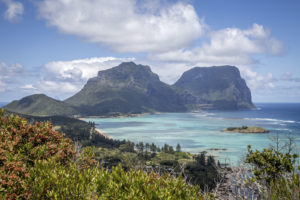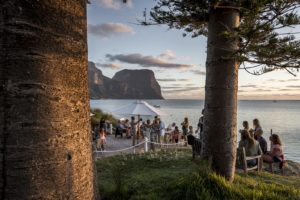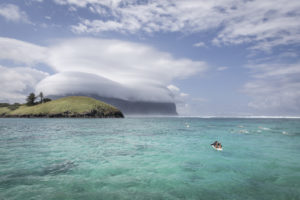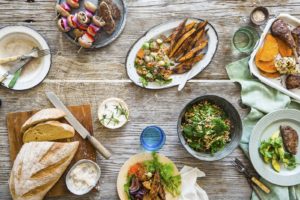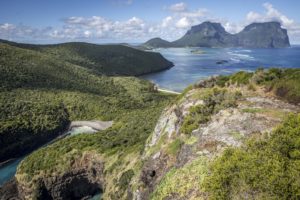Lord Howe Island is well known for its scenic beauty and biodiversity. However, it also has a relatively unknown and fascinating history. Some families have been on the same land for 160 years.
In many ways, Lord Howe Island is like a small country town in the Pacific Ocean and islanders have a healthy disrespect for mainland authority. There are only about 350 permanent residents and visitor numbers are limited to 400. Visitors are always fascinated by day-to-day island living. It’s similar to any small town in NSW, except there are a few captivating differences.
History
Lord Howe Island was uninhabited when it was discovered in 1788. The first settlers were traders who supplied whaling ships with provisions and fresh water. Our family arrived on the island in 1842 and there are several others with histories that are just as long. When you talk to the locals, they’ll often volunteer that they are a fifth, sixth or seventh generation Lord Howe Islander. Elderly locals tell stories about their grandparents, and the faces in photos from the 1880’s suddenly come to life. Our own Great Great Uncle Bertie stowed away from Lord Howe Island on a whaling boat and went down on the Titanic.
If you’re interested in local history, then the Lord Howe Island Museum is a good place to start. You might also enjoy Kerry McFadyen’s entertaining and informative book: Pinetrees Lord Howe Island 1842-1992. A Brief History of the Andrews-Nichols- Kirby families. You can spend an hour wandering around the Lord Howe Island cemetery at Neds Beach or the Pinetrees cemetery on Lagoon Road (opposite the Pinetrees boatshed). It doesn’t take long to draw some family trees.
Schooling
Local children attend the Lord Howe Island Central School. The school has been operating since 1879. It has approximately 30 students in kindergarten to year 6. High school students can attend the school, but are enrolled in a distance education program. You’ll see the school kids riding their bikes to school. Most of them have bare feet. In fact, bare feet are official school uniform. Many island children attend boarding schools in Sydney or Brisbane and stay on the mainland to complete university or other training.
Government
Lord Howe Island is part of New South Wales. The local government is the Lord Howe Island Board, established under the Lord Howe Island Act 1953 (NSW). There are four elected local members on the Board and three members appointed by the NSW Minister for Environment and Conservation. As a World Heritage listed island, Lord Howe receives decent funding from all levels of government, and is well-maintained as a result.
Land
The early settlers were squatters who had no title to their land. There is still no freehold title on Lord Howe Island. When the Lord Howe Island Act was passed in 1953, islanders received leases and licences to use the land. There are leases in perpetuity for residences, special leases for agriculture or grazing for a maximum term of 10 years and permissive occupancies which give a bare right to occupy the land. Despite the insecurity of title, many families have lived on the same land for generations.
When land is offered for sale, it is offered to island people first, at a price determined by the NSW Valuer General. If no islander wants to buy the land, it can be sold to non-islanders. However, it is a condition of the lease that the new owner makes the island his or her permanent home. There are no holiday houses on Lord Howe. This system is an important part of maintaining a viable community. If the homes were only used for a few weeks a year by holiday-makers, we wouldn’t have a school, a hospital, a post office or a regular shipping service.
Island homes
It’s very expensive to build on Lord Howe. Building materials have to be shipped to the island, which can double the cost of some things. You won’t see any McMansions with triple garages. People mostly live in relatively small, simple houses built of lightweight materials. Land is rarely for sale and it’s common for adult children to live with their parents or in a small flat or house on the same property as the family home. After a planning process in the early 2000s, the Lord Howe Island Board granted permission for eight new dwellings to be built on existing family blocks. There are also plans to release some vacant land for sale to islanders.
The streets on Lord Howe have names, but no house numbers. The older houses are well screened from the road – you won’t even see them. If you’re new on Lord Howe, it can be a challenge to find a house unless you’ve been there before.
During the Second World War, many island people worked on a farm to produce vegetable seeds for Yates. It was an important part of the war effort because in the pre-war years Australia relied heavily on seeds imported from Europe. These days, lots of people have good vegetable gardens and orchards. The ship only arrives once every fortnight and a home garden is still the best way to ensure fresh produce all year round. The barter system is alive and well. It’s common to swap some of your excess avocados for fresh fish.
Food
Islanders have lots of BBQs – BBQ kingfish in particular. The Bowling Club and Golf Club serve good pizzas, steak, fish and chips. Most islanders have accounts at the local general stores (and rarely carry money). They also order boxes of provisions, via the ship, from supermarkets in Port Macquarie. ‘Foodie’ islanders still manage to get their hands on most delicacies. The best delicacy, though, is fresh Lord Howe Island fish, and many families have a boat to access the best fishing spots.
Economy
Most people on Lord Howe Island work in tourism. There are only about 350 residents, so people wear lots of hats to get the non-tourism jobs done. You’ll see Gower Wilson milking his cows twice a day and re-fuelling the Qantas plane. He’s a good fisherman and he’s also the local mechanic. Although his specialty is refrigeration, he’s always called if there’s a problem with anything mechanical. When he goes away, which luckily isn’t that often, the whole island holds its breath until he returns.
Community
In a small community, everyone knows everyone. Lord Howe is particularly friendly – locals wave to each other every time they ride or drive past. The local phone book uses nicknames, first names and surnames, just to make sure, but most people know your phone number. Often when locals ring, they don’t introduce themselves. It can sometimes take a while to figure out who you’re talking to. Sometimes, you never know.
A small friendly community means great events and parties. A small gathering can become large without prompting, and by the end of the party, everyone has forgotten the purpose of the occasion. Island weddings are huge, whether they’re on the island or not, and it’s not uncommon for a large proportion of the island population to fly to Sydney, or further, for an islander wedding. Qantas struggles with a mass exodus. Island funerals are compelling and reinforce a strong sense of place and community. It’s unusual in contemporary Australia to be buried next to five generations of ancestors.
The most striking aspect of the Lord Howe community is the enthusiasm of people to help each other. Cooperation goes a long way on a remote island. When we had to lay a power cable for our new staff accommodation, we sent a message to the bowling club that we needed “a few people to help”. Next morning there were 40 men and a tractor, and the job took 15 minutes.
Sport
Like most Australian communities, sport is the great leveller, and Lord Howe is a sporty place. Regular team competitions are difficult, since it’s hard to fly to Port Macquarie every weekend. Most islanders participate in small team sports and individual sports – golf, lawn bowls, touch football, tennis and surfing are all popular. There’s also a fit bunch of swimmers, runners, walkers and pram-pushers.
The Lord Howe Island Golf Club hosts a 9 hole Chicken Run on Friday afternoons, and an 18 hole competition on Sundays. The Lord Howe Island Open is held in November each year and is very popular.
Many local people play lawn bowls. It’s highly competitive! The Lord Howe Island Bowling Club has two open tournaments each year and they’re so popular that it can be a struggle to find enough staff during those weeks. The Bowling Club bar is open every afternoon from 4:30pm. It’s a good place to go to watch the football or the cricket on a big screen.
There’s a casual touch footy game on the Cricket Ground two afternoons per week. Check the blackboard on Lagoon Road for times. Again, visitors are welcome, just show up!
Every year on 17 February, islanders celebrate Discovery Day. There is an evening sports carnival on the Cricket Ground. There’s a slow bicycle race, tug-of-war and a relay or two. There are also races for different age groups including pre-schoolers, “old buffers” and “old beauties”. We have found that people really do run faster after a glass or two of wine. It’s serious competition and grown adults running in the three-legged race hit the ground hard when they trip.
Communications
The island has reasonable broadband internet access, but no mobile phone coverage. It feels strange for a day or two, but most of our guests enjoy leaving the phone in their room. There are several public phones on the Island, including one at Pinetrees.
We receive newspapers from Sydney, but you can’t buy one at the shop in the morning as they don’t arrive until the afternoon plane. The local paper is the Lord Howe Island Signal – it’s published every fortnight. You can buy the latest Signal at Joys Shop, Thompsons Store or Anchorage. It’s an entertaining mix of island news, politics and gossip. The distribution list is international.
The Lord Howe Island Post Office is in the CBD. Letters arrive by plane each day. All parcels except those sent by Express Post arrive by ship every fortnight. You need to visit the Post Office to collect the mail – there’s no delivery service.
The local radio station is Triple J, which is re-broadcast from the Lord Howe Island Radio Station. Locals are up-to-date with their music.
Shipping
The cargo ship, MV Island Trader, sails from Port Macquarie to the island every fortnight and unloads at the jetty. The ship carries everything from groceries to new cars, water tanks, building supplies and fuel for the diesel generator and the Qantas planes. On the return voyage, the ship takes recyclables and garbage back to Port Macquarie. Occasionally visitors arrive by ship. Most of them are so seasick that a return flight with Qantas suddenly seems inexpensive. There’s also a cargo plane from Port Macquarie once or twice a week.
Power and water
Lord Howe has a diesel generator near Middle Beach, which produces the island’s electricity. The generator has limited capacity and air conditioners aren’t permitted as they use too much power. With Lord Howe’s sub-tropical climate and cool ocean breezes, you don’t need air conditioning anyway.
There’s no central water supply at Lord Howe. Island residents collect their own rain water in tanks. Rain water tastes incredible. It’s better than Evian, any day. At Pinetrees, we also have a bore and we use treated bore water for everything except drinking. Some other businesses on the island use desalinated water.
Police
There is one policeman on Lord Howe Island – he’s also the Harbour Master. Everyone thinks that he has an easy job because people on Lord Howe don’t bother to lock their doors and always leave the keys in the car. Just make sure you wear your bike helmet and stick to the 25km per hour speed limit!
Rubbish
In the old days, rubbish was burnt or buried – we’ve uncovered countless bottle dumps over the years. It seems that Pinetrees guests in the old days drank a lot of beer! Managing the island’s waste isn’t easy. Since 2000, Lord Howe has had a state-of-the-art Vertical Compost Unit (VCU) which processes the island’s organic waste including meat, dairy products, food scraps, green waste, cardboard, paper and sewage sludge. There is a three bin sorting system – recyclables, compostables (all types of food, green waste) and garbage (plastics, bottle tops and other non-food and non-recyclable rubbish). Recyclable rubbish and some garbage (including nappies) are returned to the mainland on the ship every fortnight. You can help to minimise waste on Lord Howe by separating your waste, using re-useable bags instead of plastic bags for shopping, and conserving water and energy.


